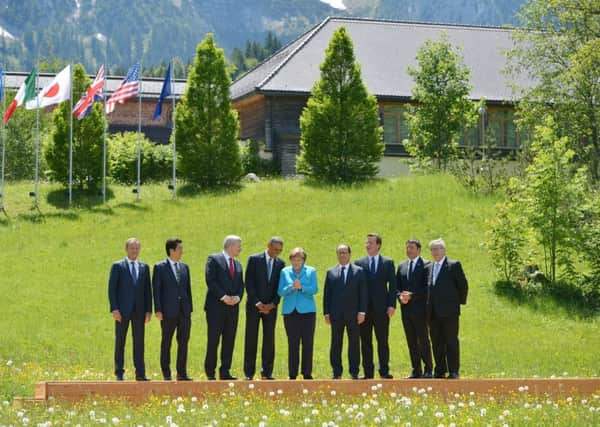UK to send army trainers to Iraq to battle IS


Speaking at the G7 summit of major industrialised states in Germany yesterday Mr Cameron described the fight against Islamist extremism as “the biggest challenge” currently faced by Britain and the international community.
Earlier yesterday, Mr Cameron said he was hopeful that the G7 summit will show “a united front against Russian-backed aggression” in Ukraine.
Advertisement
Hide AdAdvertisement
Hide AdMr Cameron acknowledged that the sanctions imposed on Moscow following the annexation of Crimea last year were also having “an impact” on European states, but made clear he wants them maintained when they come up for renewal at the end of July.
US president Barack Obama also said the summit in Germany would show the West’s major industrialised states “standing up to Russian aggression in Ukraine”.
Speaking about the new army deployment, which was in response to a request from Iraqi prime minister Haider al-Abadi, Mr Cameron said it will bring to 275 the number of UK military personnel in Iraq supporting the Baghdad government and Kurdish authorities in their struggle with IS, which has seized large swathes of the country and neighbouring Syria.
The bulk of the personnel – around 100 of those deployed – will train local forces in detecting and dealing with the roadside bombs and booby-trap explosives used by IS. Another 25 will focus on logistics challenges such as bridge-building.
While Britain’s mission in Iraq has so far been largely focused on the Kurdish capital Irbil, the new troops will be stationed at a number of bases around the country, including Baghdad. It is understood they will remain inside bases and will not be deployed in the field. The announcement came as Mr Cameron met Mr Obama in the margins of the Schloss Elmau summit for one-on-one talks which were expected to focus on defence issues.
Washington is concerned that UK spending on defence may drop below the Nato target of 2 per cent of GDP, with Defence Secretary Ashton Carter last week warning that such a cut would suggest Britain was “disengaged” and could no longer “punch above its weight” on the international scene.
Noting that the UK was one of only a handful of Nato states to meet the target, Mr Carter said: “We need an engaged United Kingdom.”
Despite lecturing other leaders at last year’s Nato summit in Wales on the need to hit the 2 per cent target, Mr Cameron has so far declined to commit the government to continue meeting it beyond March 2016.
Advertisement
Hide AdAdvertisement
Hide AdChancellor George Osborne’s demand last week for a further £500 million in Ministry of Defence cuts has fuelled concerns on the Tory backbenches that the UK may drop below the totemic threshold next year.
Speaking ahead of his meeting with Mr Obama, Mr Cameron said he would have no assurance to offer the US President until this autumn’s Spending Review, when Mr Osborne will set out the government’s plans for the three years after April 2016.
Asked what he would tell Mr Obama about Britain’s plans for future defence spending, Mr Cameron told reporters: “I’ll say exactly the same as what I’m saying now, which is we’ve kept our 2 per cent promise – one of the few countries to do it – and we’re having a Spending Review in the autumn and we’ll announce the results at that time.”
Mr Cameron said most of the troops he is sending to Iraq will be involved in operations against improvised explosive devices). When withdrawing from occupied areas, IS routinely leaves booby-trap devices to render the area uninhabitable.”